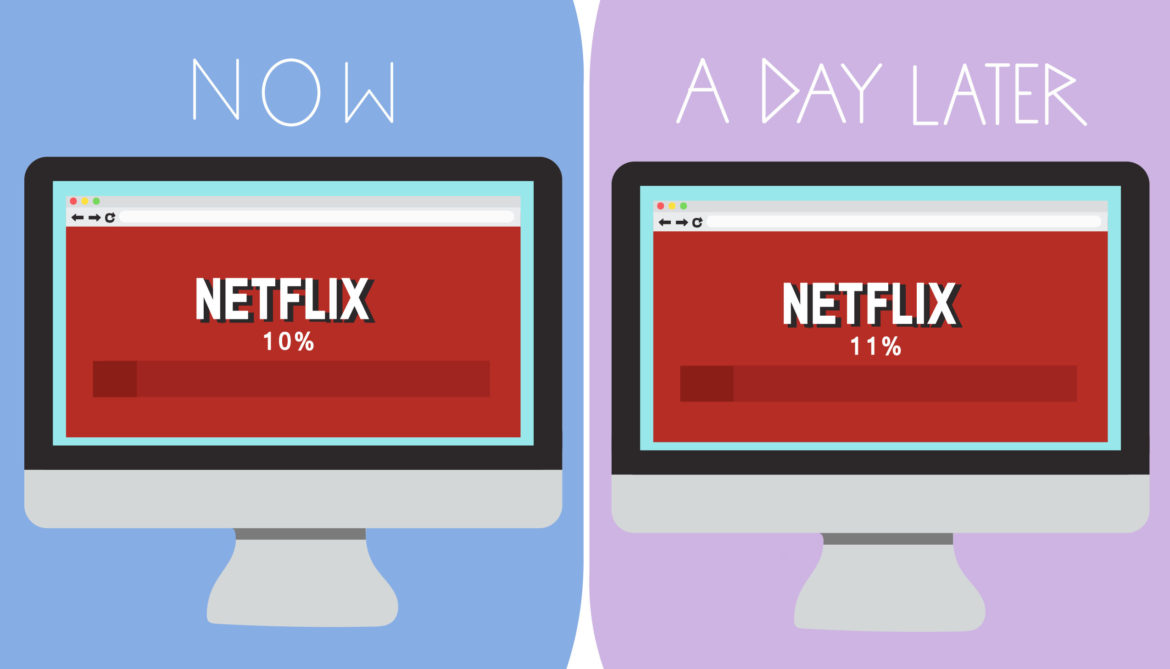Netflix loads on a student’s computer, only going up one percent over the course of a day. With the repeal of net neutrality, this scenario could become reality for people who are not able to pay for the highest quality internet service. Graphic by Suncana Pavlic
The repeal of net neutrality on Dec. 14 poses scary possibilities for citizens of Athens.
The Internet is an essential part of everyday life for millions of young people across America, and the structure in which it is presented is crucial. Net neutrality, according to the Oxford Dictionary, is the idea that “Internet service providers should enable access to all content and applications regardless of the source, and without favouring or blocking particular products or websites.”
On Dec. 14, the Federal Communications Commission voted to repeal net neutrality, a decision that means internet service providers (ISPs), such as Verizon, Comcast and AT&T, would no longer be legally required to allow unrestricted, unpaid access to all websites fairly.
If net neutrality were repealed, ISPs could potentially block or slow down access to websites from competing brands, as well as charge companies more money to deliver their services to consumers.
As a result of not having net neutrality, the Internet could become a tiered service — where Internet speed, quality, and even access to different websites, could only be accessed if users choose to pay for the highest tier, and those who didn’t would be shut out from these services.
This could be extremely problematic for people who can’t afford to pay for a higher tier of Internet.
According to the Athens-Clarke County Public Information Office, 37.8 percent of the people in ACC live below the poverty level. Restricting fair, open access to the world wide web could prevent thousands of hardworking people from getting information they may need to work or study, hindering their success.
Athenians below the poverty line aren’t the only ones this new repeal could affect.
Without net neutrality, ISPs could decide to make websites like Netflix slower unless the company pays a certain fee.
According to Tim Denson, candidate for Athens-Clarke County Commissioner in District Five, a development like this could pose a problem for small business owners in Athens.
“Websites like Amazon, large ones that can afford to pay the extra fees to ISPs for faster speeds, they’ll get through, but small businesses that try to sell things online won’t have that ability,” Denson said. “It’s definitely going to slow down innovation, it will limit our options for products and services, it can have really damning effects in the long run for all levels of society, not just in Athens but throughout our entire country.”
The solutions, however, may also lie in our local government.
Chattanooga, Tenn. is home to the Electric Power Board (EPB), a city-owned ISP which grants citizens with web access that follows the standards set forth by net neutrality. If Athens were to implement a similar service, it would eliminate the looming threat of a tiered or restricted Internet, for the people who need it the most.
According to the New York Times article, “What’s Next After the Repeal of Net Neutrality,” major broadcasting companies have denied present or future plans to prioritize consumers based on payment, and do not plan to block websites.
However, the legality of their actions should companies choose to do it poses a threat to Americans’ freedom — a threat that should not exist.
